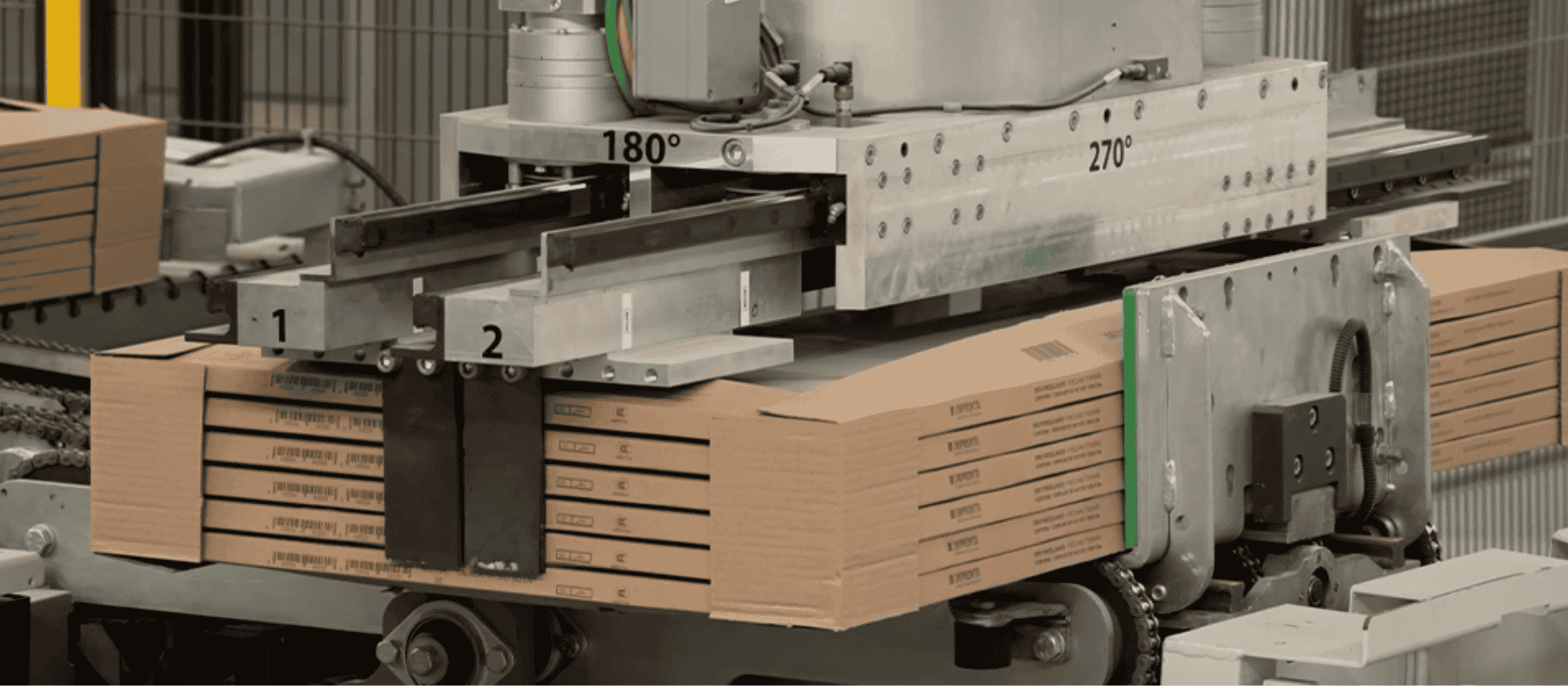Del desafío al cambio: cómo Cartonstrap apoya una producción cerámica más eficiente y responsable
El embalaje es una parte fundamental de la producción cerámica. Influye en cómo se transportan las baldosas y en cómo se manipulan durante la instalación. También afecta los objetivos de sostenibilidad y el cumplimiento de normativas cada vez más detalladas. Para los fabricantes, no se trata de cuestiones marginales: forman parte del rendimiento global de todo el proceso.
Cartonstrap fue desarrollado por System Ceramics para abordar estos aspectos con una solución precisa: una máquina sin plástico que une y protege los paquetes de cajas de baldosas utilizando únicamente cartón y cola hot melt. Se integra con las líneas de embalaje existentes, mejora la manipulación en obra y ayuda a reducir el desperdicio de material sin añadir complejidad al flujo de trabajo.
Italgraniti, una referencia italiana en la producción de gres porcelánico, ha sido uno de los primeros fabricantes en instalar esta máquina. “En 2024 tomamos la decisión de adoptar Cartonstrap porque la sostenibilidad es central en nuestro proceso”, explica la empresa. “Nos hemos centrado especialmente en reducir el plástico en el embalaje, y esta máquina nos permitió eliminar el uso de flejes”.
Una solución que responde a necesidades reales de producción
Cartonstrap funciona aplicando cuatro esquinas de cartón troquelado a cada pila de cajas de azulejos. Estas esquinas están precortadas, hendidas y pegadas con adhesivo hot melt, una solución de unión ampliamente utilizada y fiable en las líneas cerámicas. El resultado es una pila unificada y estable, fácil de manipular, lista para paletizar y protegida durante el transporte.
Esta configuración ofrece múltiples beneficios en un solo paso. Cada caja queda protegida físicamente en las esquinas, reduciendo la posibilidad de daños en los bordes. Al mismo tiempo, toda la pila gana integridad estructural, incluso bajo presión vertical, sin necesidad de flejes de plástico.
El formato también facilita la manipulación más adelante en la cadena: en la obra, los instaladores pueden simplemente cortar la esquina de cartón y retirar una caja de azulejos a la vez, en lugar de manejar paquetes sujetos con flejes de plástico. “Es una mejora real”, confirma Italgraniti. “Evitamos el riesgo de que cinco o seis cajas caigan juntas solo porque se cortó un fleje”.
Rendimiento integrado, diseño simplificado
Cartonstrap fue diseñado pensando en la integración. Su estructura compacta le permite adaptarse a los layouts existentes de las plantas, particularmente aguas abajo de las máquinas de embalaje de System Ceramics, pero también como una solución de retrofit. Cuenta con un único módulo de cuadrado y pegado, dos alimentadores laterales de cartón que pueden recargarse sin detener la producción, y una capacidad de hasta cinco pilas por minuto. Todas las funciones, incluyendo las dimensiones de las esquinas de cartón, se controlan mediante software, lo que facilita la adaptación a diferentes alturas de pila o cambios de formato sin intervención mecánica.
Compatible con una amplia gama de tipos de cartón, incluyendo papel kraft reciclado, Cartonstrap soporta formatos troquelados de hasta 1200 por 200 milímetros y maneja pilas de baldosas entre 75 y 200 milímetros de altura. Estas especificaciones lo hacen adecuado para entornos de alto volumen y formatos variables, precisamente donde el rendimiento del embalaje debe ser confiable y adaptable al mismo tiempo.
Una respuesta clara a los objetivos de sostenibilidad
Sustituir los flejes de plástico es un paso hacia una sostenibilidad estructural y medible. Según estimaciones internas, cada unidad de Cartonstrap puede eliminar hasta dos millones de metros de flejes de plástico por año. El uso de cartón (especialmente reciclado) reduce drásticamente los residuos de embalaje y facilita el cumplimiento de las normativas ambientales.
Para las empresas que exportan a mercados como Alemania, Cartonstrap también ofrece una ventaja directa en términos de cumplimiento normativo. Está totalmente alineado con el VerpackG, la normativa alemana sobre embalajes, que exige transparencia en los materiales utilizados y responsabilidad en la gestión del packaging que se coloca en el mercado. En un contexto europeo donde las regulaciones evolucionan rápidamente, contar con un sistema que simplifica estos requisitos representa una ventaja competitiva real.
Protegiendo el producto y el proceso
Uno de los aspectos más subestimados de Cartonstrap es su contribución al valor en etapas posteriores de la cadena. Al proteger cada caja individualmente, reduce la probabilidad de reclamaciones relacionadas con esquinas dañadas o pilas colapsadas. Y al facilitar la retirada segura y controlada de los paquetes en obra, también disminuye el riesgo de lesiones a los instaladores o daños a los azulejos.
Estos no son beneficios secundarios. Se traducen directamente en menos pérdidas, mejor reputación y una experiencia del cliente más fluida. También reflejan un cambio en la forma en que los fabricantes comienzan a percibir el embalaje: no solo como un contenedor, sino como una parte activa de la integridad del producto.
Una tecnología moldeada por la visión
Cartonstrap es el producto de la continua inversión de System Ceramics en investigación y desarrollo. Refleja una estrategia más amplia: diseñar máquinas que respondan a las necesidades actuales mientras anticipan lo que viene. En el caso del embalaje, esto significa combinar automatización, conciencia ambiental y facilidad de uso en un único sistema elegante.
La decisión de las empresas de adoptar Cartonstrap demuestra la preparación del mercado para este cambio. Los productores ya no buscan ajustes incrementales; buscan tecnologías que les permitan alinear los objetivos de producción con la responsabilidad ambiental, la flexibilidad operativa y la presión normativa, todo al mismo tiempo.
Descubre cómo Cartonstrap de System Ceramics puede ayudar a redefinir tu línea de embalaje, mejorando la seguridad, la sostenibilidad y el control.
